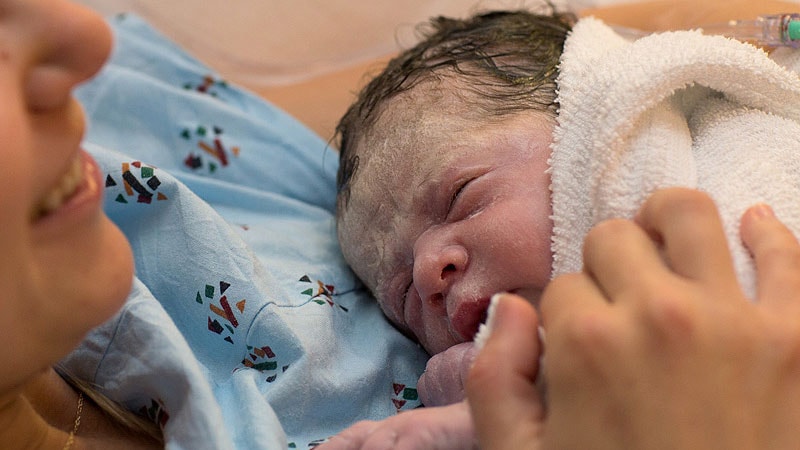Vaginal Microbiome's Limited Impact on Infant Gut Microbiome
核心概念
Maternal vaginal microbiome has minimal influence on infant gut microbiome development.
摘要
The study challenges the common belief that an infant's gut microbiome is primarily shaped by the mother's vaginal microbiome. It highlights that practices like vaginal seeding are ineffective. The research involved over 600 pregnant Canadian women and their newborns, showing significant differences in infant stool composition by delivery mode at 10 days postpartum, but these differences were not linked to the mother's vaginal microbiome and disappeared by 3 months. The study emphasizes that cesarean delivery does not negatively impact the baby's gut microbiome and advises against vaginal seeding. The research was published in Frontiers in Cellular and Infection Microbiology and analyzed vaginal and stool microbiome profiles from 442 mother-infant pairs. The findings suggest that maternal vaginal microbiome composition does not significantly affect infant stool microbiome composition and development, indicating that other factors play a more crucial role.
Vaginal Microbiome Does Not Affect Infant Gut Microbiome
統計資料
"A longitudinal, prospective cohort study of more than 600 pregnant Canadian women and their newborns showed significant differences in an infant's stool composition by delivery mode at 10 days post partum."
"The mean age of the mothers at delivery was 34.6 years."
"Intrapartum antibiotic administration was identified as a confounder of infant stool microbiome differences."
引述
"The bacteria living in the maternal vagina are the first microbes that vaginally delivered infants are exposed to...so it sounds intuitive that different kinds of vaginal microbiomes could end up influencing the development of a baby's gut microbiome in different ways." - Scott Dos Santos
"More evidence is needed involving a more ethnically diverse sampling of patients." - Dr. Emily Adhikari
深入探究
How do cultural differences impact the development of infant gut microbiome?
Cultural differences can impact the development of the infant gut microbiome through various factors such as diet, lifestyle, and environmental exposures. Different cultural practices may influence the types of microbes that infants are exposed to early in life, which can shape their gut microbiome composition. For example, cultural dietary habits can introduce specific types of bacteria into the infant's gut, affecting the diversity and balance of the microbiome. Additionally, cultural practices related to hygiene, breastfeeding, and antibiotic use can also play a role in shaping the infant gut microbiome. Therefore, understanding and considering cultural differences is essential in studying and promoting healthy gut microbiome development in infants across diverse populations.
What are the potential drawbacks of dismissing the influence of the maternal vaginal microbiome on the infant gut microbiome?
Dismissing the influence of the maternal vaginal microbiome on the infant gut microbiome can have several potential drawbacks. Firstly, it may lead to the neglect of important factors that could impact the establishment of a healthy gut microbiome in infants. The maternal vaginal microbiome is one of the first microbial exposures for vaginally delivered infants and was previously believed to play a significant role in shaping the infant gut microbiome. By disregarding this influence, healthcare providers and researchers may overlook critical aspects of early microbial colonization and development in infants.
Secondly, dismissing the role of the maternal vaginal microbiome may result in the continuation of ineffective or potentially harmful practices such as vaginal seeding. Despite the study's findings that the maternal vaginal microbiome does not predict the infant stool microbiome, some individuals may still advocate for interventions based on outdated beliefs. This could expose infants to unnecessary risks without providing any real benefits.
Lastly, overlooking the influence of the maternal vaginal microbiome may hinder further research and understanding of the complex interactions between maternal and infant microbiomes. By assuming that the maternal vaginal microbiome has no impact, researchers may miss out on valuable insights that could improve maternal and infant healthcare practices.
How can advancements in microbiome research benefit maternal and infant healthcare beyond gut health?
Advancements in microbiome research can significantly benefit maternal and infant healthcare beyond gut health by providing insights into various aspects of maternal and infant well-being. Understanding the microbiome can help identify risk factors for conditions such as preterm birth, preeclampsia, and gestational diabetes, allowing for early interventions and personalized care. By studying the microbiome, healthcare providers can also develop strategies to prevent and treat infections during pregnancy and childbirth, improving maternal and neonatal outcomes.
Furthermore, microbiome research can inform the development of probiotics and prebiotics tailored to maternal and infant health needs. These interventions can help maintain a healthy microbiome balance, support immune function, and prevent conditions such as allergies and asthma in infants. Additionally, advancements in microbiome research can lead to the discovery of biomarkers that indicate maternal and infant health status, enabling early detection of potential issues and targeted interventions.
Overall, advancements in microbiome research have the potential to revolutionize maternal and infant healthcare by providing a deeper understanding of the role of microbes in health and disease. By leveraging this knowledge, healthcare providers can offer more personalized and effective care to pregnant women and infants, ultimately improving outcomes and promoting lifelong health.

